By Jens Glüsing, Maik Grossekathöfer and Horand Knaup
There are 50 murders a day in South Africa, the host country of the 2010 football World Cup. And Brazil, host of both the 2014 World Cup and the 2016 Olympics, also suffers from extreme violence. With a view to the high-profile events, the two countries are now attempting to crack down on rampant crime -- and are using ruthless tactics to do so.
An orchid, a laptop and a Bible adorn the desk of Pricilla de Oliveira Azevedo. She is wearing the blue uniform of the military police, but there is no weapon visible in her small office. Her territory is the Favela Santa Marta, a hillside slum in the heart of the southern tourist zone of the Brazilian city of Rio de Janeiro. From the top of the hill, there is a magnificent view of Sugar Loaf Mountain, the statue of Christ the Redeemer and Copacabana beach.
Until the end of last year, the Comando Vermelho, or Red Command, the city's largest and oldest organized crime group, controlled Santa Marta, a favela with a population of about 10,000. The street leading up the hill begins behind a German school. Child soldiers working for the drug mafia used to stand guard at access points into the slum, wearing T-shirts and sandals, with Kalashnikovs slung over their shoulders and pistols stuck into the waistbands of their Bermuda shorts. Only a few steps away from a main thoroughfare, they sold cocaine, crack and marijuana.
Today Azevedo, 31, controls the neighborhood. She commands 120 police officers that now patrol the favela's narrow streets around the clock. The residents greet them politely and ask for their help with domestic violence or when a neighbor's music is too loud. There hasn't been a murder in the neighborhood in more than a year.
Azevedo runs Rio's first UPP, which stands for "Police Pacification Unit." These units are Rio's trump card for the 2014 Soccer World Cup and the 2016 Olympics.
Too Dangerous
The city's residents were ecstatic a month ago, when Rio de Janeiro won its bid for the Olympics, defeating competitors Chicago, Tokyo and Madrid, even more so than they were two years ago, when Brazil was selected to host the 2014 World Cup. Rio had been in the running for the games twice before, and now it had succeeded, bringing the Olympics to South America for the first time. Now, finally, beach volleyball will be played on the world's most famous beach, against a backdrop of sunshine, the ocean and palm trees.
But the euphoria had hardly subsided before the critics began speaking out in large numbers. Awarding the games to Rio, they said, was not an example of modern sports policy, but pure lunacy. The city, they argued, is much too dangerous.
It was the same story five-and-a-half years ago, when the International Federation of Association Football (FIFA) decided to hold the 2010 World Cup in South Africa. The country has one of the world's highest crime rates, with 200,319 murders committed in the last 10 years. One could praise FIFA's decision as a form of development aid, or one could simply call it negligent. To remove such doubts, Brazil and South Africa must now find ways to guarantee the safety of fans and tourists.
Rio de Janeiro, with its 6 million residents, is one of the world's most violent cities, a place where robberies, murders and kidnappings are routine. There were 5,717 murders last year in the state of Rio de Janeiro, which includes the city. Drug cartels control about 300 of the more than 700 favelas, and the drug bosses employ thousands of soldiers, some of them armed with bazookas.
Violent Standoff
The brutality with which rival gangs go about their business was in full evidence in mid-October once again in a favela called Morro dos Macacos, or Monkey Hill. Two warring drug gangs engaged in gun battles in the favela, and they even shot down a police helicopter with their submachine guns as it was trying to make an emergency landing on a nearby football field. At the end of the week-long standoff, at least 21 people had been killed.
The city now plans to have more than 60,000 police officers, including units like the one run by Captain Azevedo, patrolling the streets in time for the 2014 World Cup. There will be 1,000 cameras installed, from the beaches to the most important residential areas, to keep an eye on trouble spots. All police stations will be outfitted with computers, and the police, traffic authority and fire department will all be connected in a common computer network, something which has not been the case up until now.
The city also wants to buy two unmanned drones to keep watch over the favelas from the air. After the violence on Monkey Hill in October, Justice Minister Tarso Genro announced that the equivalent of €98 million ($145 million) had been earmarked for immediate action programs. "We want to permanently improve security in the city, not just for three or four weeks here and there," says José Mariano Beltrame, Rio's secretary of public security. He sounds confident.
'An Abnormal Criminal Problem'
South African President Jacob Zuma sought to convey the same confidence at a speech he gave in Pretoria a month ago. But South Africa, unlike Rio, lacks the time for long-term operations; the kickoff is just over seven months away, on June 11, 2010. Zuma, forming the shape of a pistol with his thumb and index finger, said: "We have an abnormal criminal problem in South Africa. We must therefore apply extraordinary measures."
From April 2008 to March 2009, 18,148 people were killed in South Africa, or an average of 50 murders a day. The police also recorded 70,514 sexual offences, but the number of unreported cases is believed to be much higher. In Gauteng province, where there are three World Cup stadiums and where the German team plans to stay, the murder rate has risen by 6 percent, the number of residential robberies by 11 percent and the number of store holdups by 22 percent.
Almost two-thirds of all homicides happen in the townships. The slums with the highest murder rates are directly adjacent to the cities where matches will be held next summer: Umlazi, outside Durban, and Nyanga, near Cape Town. The violence has also taken hold in upscale residential neighborhoods where residents seek to protect themselves with security cameras, electric fences and guard dogs. This summer Force Khashane, a nationally renowned journalist, was shot dead by six bullets in front of his home.
New Standards
The government has taken steps to combat the violence. The police has spent €115 million on the World Cup alone, purchasing 10 water cannons and six helicopters. To improve the quality of the police force, whose officers have been known to wait an inordinate amount of time before heading to the scene of a crime, hiring standards have been tightened. However, 41,000 additional police offers who will patrol the World Cup stadiums next year, and who attended accelerated training programs, are not affected by the new standards.
The army was brought in to provide extra security at the Confederations Cup in June, a dress rehearsal of sorts for the World Cup. For next year's event, the FBI, Germany's Federal Criminal Police Office (BKA) and Britain's Scotland Yard will advise the South Africans on how best to secure arenas and tourist areas.
President Zuma has decided to take a tougher approach to fighting crime. Shortly after taking office in May, he appointed Bheki Cele as his new police commissioner, a wiry hardliner who sometime refers to criminals as "cockroaches" and advises police officers to "shoot them in the head." When the police recently killed six gangsters as they were trying to hold up a money transport, he told the men: "Well done."
Cele is working under high pressure, and with the president's explicit support, to draft a law that would allow his officers to retaliate regardless of the circumstances, the motto being "shoot to kill." Under current law, South African police officers are only permitted to shoot if they or people around them are threatened. In the future, violent criminals could also be shot as they are attempting to flee -- and not just in the legs.
Reclaiming the Slums
Rio's police force is no less squeamish, having killed about 1,100 people last year, when it began storming and occupying favelas. However the government has also sent social workers to the Santa Marta slum, the electric utility has legalized the power supply, the water company has installed a new sewer system, and garbage collection now reaches even the remotest parts of the slum. There is now a tram that travels to the top of the hill, stopping at five stations along the way. "Step by step, the city is reclaiming the favelas," says José Mariano Beltrame, Rio's security minister.
Five favelas were pacified using similar measures in recent months, including Cidade de Deus (City of God), a favela made notorious by the film of the same name. Forty-seven other favelas are on the city's priority list, and four are scheduled for occupation by the end of the year.
The most difficult and largest slums are yet to come: the Rocinha, Morro do Alemão and Maré favela complexes. Each of these giant slums is home to about 100,000 people, and the drug bosses who control them have a veritable military arsenal at their disposal. The expressway to Rio's international airport, which leads directly through the Maré favela complex, often has to be closed because of gun battles, and drivers are frequently robbed while stuck in traffic jams.
A Real Estate Boom?
Rocinha lies along the main road between Rio's southern zone and the Barra da Tijuca district, where most of the events will take place during the Olympics. The federal government is investing hundreds of millions of reais into urbanizing the slum, but occupation is a step the police are still reluctant to take. The drug gang in Rocinha is considered one of the city's best armed.
If the authorities manage to pacify Rocinha, the favela -- located opposite one of the city's most expensive residential areas, between a country club and the beach -- could experience a real estate boom before the 2014 World Cup. In Santa Mara, the favela now under Captain Azevedo's control, real estate prices have shot up since the police occupation began.
In locations higher up the hill, with views of Sugar Loaf Mountain, a shack could once be had for about 20,000 reais (around €8,000 or $12,000). Prices have since tripled.
Translated from the German by Christopher Sultan
Source : http://www.spiegel.de/international/world/0,1518,659427,00.html

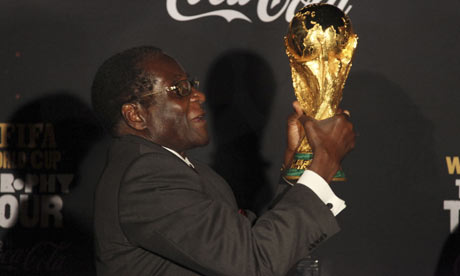
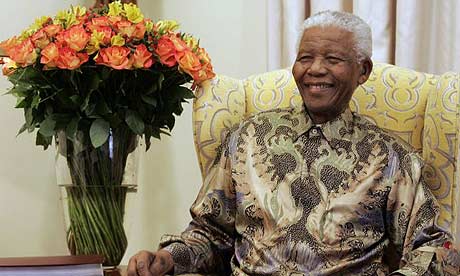





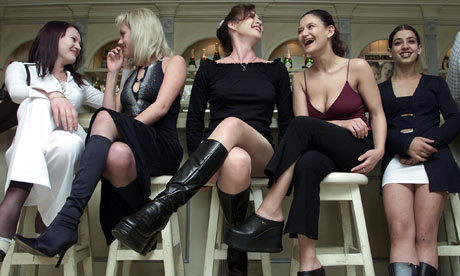
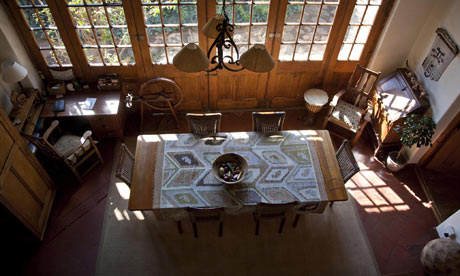
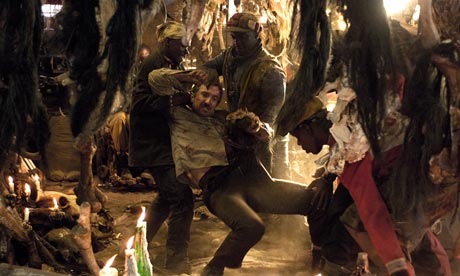
![[Bharti Airtel and MTN face similar challenges as they try to squeeze profits out of users who pay on average just a few dollars per month for service. Above, a mobile phone customer in India this month.]](http://s.wsj.net/public/resources/images/MK-AY584_bharti_DV_20090927153443.jpg)